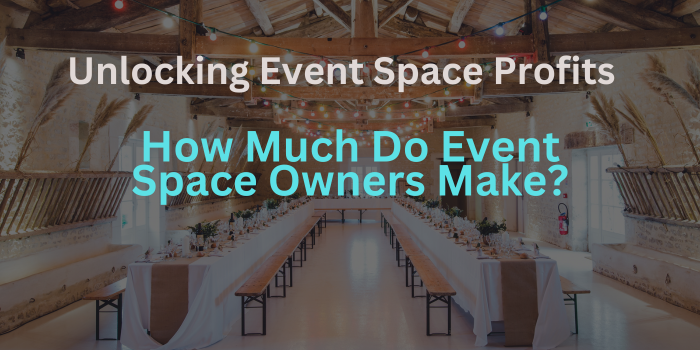In this article, we will explore into the world of event space owners and explore the financial aspects of their businesses.
From rental fees to revenue sources, we’ll shed light on how much event space owners can make and the factors that influence their income.
The events industry has witnessed substantial growth in recent years, with an increasing number of individuals and organizations seeking unique and versatile spaces to host their special occasions.
As a result, event space ownership has emerged as an attractive venture for entrepreneurs seeking to capitalize on this thriving market.
How much do event space owners make?
On average, a wedding banquet hall can generate approximately US$60,000 to $100,000 per year when hosting 25 to 30 events annually. However, the actual earnings vary based on various factors, and with the right strategies in place, the annual revenue can even reach mid six figures.
Factors affecting event space income
The income generated by event space owners can vary significantly based on several crucial factors. Here are some of the key elements that influence the earning potential of event space owners:
Location of the event space
Event spaces situated in prime areas with easy accessibility and proximity to urban centers tend to attract a larger number of potential clients. Such spaces may command higher rental fees due to their convenience and visibility, contributing to increased revenue.
Size and capacity
Larger venues that can accommodate significant guest numbers are often in higher demand for weddings, conferences, and other large-scale events. On the other hand, smaller and more intimate spaces might cater to niche gatherings and provide opportunities for exclusive experiences.
Amenities and facilities
Event spaces offering top-notch amenities and facilities are likely to attract more clients and command higher rental rates. Modern audio-visual equipment, stylish decor, ample parking, catering services, and versatile seating arrangements can significantly enhance the appeal of an event space and justify premium pricing.
Reputation and reviews
Positive word-of-mouth referrals and online reviews can substantially impact an event space’s reputation and subsequent bookings. Satisfied clients who have had memorable experiences in a particular venue are more likely to recommend it to others.
Seasonal demand
Event space earnings can be influenced by seasonal demand and peak event periods. For instance, wedding venues might experience higher demand during the wedding season, while corporate event spaces might see increased bookings during certain industry conferences.
Types of Event Spaces

Event spaces come in various shapes and sizes, catering to different types of gatherings and events. Here are some common types of event spaces:
Dedicated event venues
These are purpose-built event spaces designed specifically to host various occasions, such as weddings, corporate events, parties, and social gatherings. Dedicated event venues often come equipped with all the necessary amenities and offer customizable packages to accommodate clients’ specific needs.
Hotels and resorts

Many hotels and resorts have designated areas within their premises for hosting events. These spaces cater to both business and social gatherings, and they often benefit from the existing infrastructure and services provided by the hospitality establishment.
Co-working spaces

Co-working spaces and community halls have gained popularity as event venues, particularly for small-scale business meetings, workshops, and networking events. These spaces offer a more casual and collaborative environment, attracting entrepreneurs and professionals seeking unique and creative settings.
Outdoor venues

Gardens, parks, and other outdoor settings can serve as enchanting event spaces, particularly for weddings, picnics, and seasonal events. These venues offer a natural and refreshing ambiance, making them an attractive option for those seeking an outdoor experience.
Unique and non-traditional spaces

This category includes unconventional event spaces, such as art galleries, historical buildings, warehouses, rooftops, and even private homes. Non-traditional event spaces appeal to clients looking for distinctive settings that align with their event themes or brand identities.
Sources of revenue for event space owners
Event space owners generate revenue through various channels, combining rental fees with additional services and offerings. Let’s explore the primary sources of revenue for event space owners:
Rental fees
The primary source of income for event space owners is the rental fee charged for hosting events. This fee varies based on the type of event space, its size, location, and amenities offered. Owners often have different pricing tiers depending on the event’s scale and duration. Premium rates may apply for peak days or seasons when demand is high.
Additional charges
Event spaces can offer a range of additional services to clients for an extra charge. These services may include catering, audio-visual equipment rental, event planning assistance, decoration packages, and more. By providing these supplementary services, event space owners can enhance the overall event experience and increase their revenue.
Revenue from in-house vendors
Some event spaces partner with or have in-house vendors, such as catering companies, photographers, florists, and entertainment providers. In such cases, the event space owner may receive a commission or referral fee from these vendors for promoting their services to clients. These collaborations can be mutually beneficial, as they streamline the planning process for clients and provide additional revenue streams for the event space owner.
Membership models
For event spaces that host recurring events or have a loyal customer base, implementing membership or subscription models can be a viable revenue strategy. Clients pay a periodic fee for access to the event space or discounted rates for booking multiple events throughout the year. This approach fosters long-term relationships with clients and ensures a steady income stream.
Corporate events
Corporate clients often seek event spaces for meetings, seminars, conferences, and team-building activities. These types of events tend to have higher budgets, providing an opportunity for event space owners to earn substantial revenue. Building strong relationships with corporate clients and offering tailored packages can attract repeat business in this segment.
Collaborative events
Collaborating with event organizers, community groups, and businesses for hosting joint events can be mutually beneficial. Event space owners can share costs, resources, and marketing efforts while expanding their network and client base.
Industry trends and average earnings
The event space industry is dynamic, influenced by changing trends and evolving consumer preferences. The total market size of Party & Events planning business was US$5.6 billion in terms of revenue.
Overview of the event space industry
The event space industry has experienced significant growth in recent years, driven by an increase in corporate events, weddings, social gatherings, and conferences. However, due to COVID-19, there is a 4.4% decline per year between 2017 and 2022. But in 2022, a growth of 1.3% has been recorded. The rise of experiential marketing and the desire for unique event settings have contributed to the demand for diverse and creative event spaces.
Regional variations
Earnings for event space owners can vary depending on the location and economic conditions of the region. Urban centers and popular tourist destinations may command higher rental fees due to higher demand, while event spaces in smaller towns or less populated areas might have lower average earnings.
Size of the event space
Larger event spaces with higher capacity generally have the potential to generate more significant revenue per event. However, smaller, more intimate venues can still be lucrative if they cater to niche markets or offer exclusive experiences.
Event specialization
Event spaces that cater to specific types of events or niche markets may establish themselves as experts in that domain. This specialization can lead to a strong brand identity and higher demand within the target market, translating into higher earnings.
Impact of technology
Technology plays a crucial role in the event space industry. Event space owners who invest in state-of-the-art audio-visual equipment, event management software, and online booking systems can enhance client experiences and streamline operations, positively influencing their earnings.
Tips for maximizing earnings
As an event space owner, implementing effective strategies can help optimize earnings and ensure long-term success in the competitive industry. Here are some valuable tips to consider:
Marketing strategies
Develop a strong brand identity that reflects the unique selling points of your event space. Utilize digital marketing platforms, such as a well-designed website, social media, and online listings, to reach a broader audience. Showcase high-quality images and videos of past events to provide potential clients with a glimpse of the experience they can expect.
Building relationships
Prioritize exceptional customer service and focus on building long-term relationships with clients. Encourage satisfied customers to leave positive reviews and testimonials, as these can significantly influence potential clients’ decisions. Respond promptly to inquiries and feedback to demonstrate your commitment to providing a positive event experience.
Pricing strategies
Set competitive and flexible pricing structures that consider factors like event duration, size, and demand. Offer package deals that bundle various services, providing value for money to clients while maximizing revenue for your business. Consider dynamic pricing during peak seasons to capture the higher demand.
Diversifying offerings
Expand your revenue streams by offering additional services and amenities, such as catering, event planning, or entertainment packages. Partner with trusted vendors to provide comprehensive solutions for clients. Being a one-stop-shop for event needs can attract more bookings and boost overall earnings.
Investing in technology
Stay up-to-date with the latest event technology and ensure that your event space is equipped with modern amenities. A seamless audio-visual setup, robust Wi-Fi, and state-of-the-art equipment can enhance the event experience, making your space more attractive to clients.
Challenges and risks
While owning an event space can be a rewarding venture, it also comes with its fair share of challenges and risks. Being aware of these potential obstacles and proactively addressing them is crucial for sustaining a successful event space business.
- Event spaces may experience seasonal variations in demand, with certain periods being busier than others. During off-peak seasons, securing bookings may be more challenging.
- The event space industry can be highly competitive, especially in urban areas with numerous venue options.
- Operating an event space involves ongoing maintenance and operational expenses, such as utilities, staffing, and property upkeep.
- Events can be unpredictable, and unforeseen circumstances like cancellations, last-minute changes, or damages can pose challenges.
- Client preferences and industry trends can change rapidly.
Frequently asked questions
Is running a music venue profitable?
Running a music venue can be profitable, but success depends on factors like location, booking popular acts, managing expenses, and attracting a consistent audience. Effective marketing and offering unique experiences can boost profitability.
How do you make a big venue look smaller?
To make a big venue look smaller and cozier, consider using drapes, partitions, or strategically placed furniture to create more intimate spaces. Lighting plays a crucial role in setting the ambiance and can help create a more intimate atmosphere.
Do venues pay royalties?
Yes, venues that play music publicly typically need to obtain licenses from performing rights organizations to pay royalties to songwriters, composers, and music publishers for the use of their music.
What is the most profitable music venue?
The profitability of music venues varies widely based on factors like location, size, and management. Iconic venues in major cities, known for hosting high-demand artists and events, tend to be among the most profitable.
What are the disadvantages of a large venue?
Large venues may face challenges in creating a sense of intimacy, managing crowd control, and maintaining acoustics. Higher operational costs, such as utilities and staffing, can also be a drawback.
How big should a venue be?
The ideal size of a venue depends on its intended use and target audience. Factors like capacity, seating arrangements, and event type should be considered when determining the appropriate size.
How do I make my venue stand out?
To make your venue stand out, focus on creating a unique ambiance, offering exceptional customer service, and hosting diverse and engaging events. Utilize innovative marketing strategies to attract a loyal clientele.
How do you maximize space in a venue?
To maximize space in a venue, optimize seating arrangements, use multi-functional furniture, and consider flexible layouts. Utilize vertical space for displays or installations to make the most of available area.
What is the maximum capacity of a venue?
The maximum capacity of a venue is determined by local building codes, fire safety regulations, and crowd management considerations. It is crucial to adhere to these guidelines to ensure safety during events.
How do you fit more people in a venue?
To accommodate more people in a venue, explore creative seating arrangements, optimize standing areas, and consider utilizing outdoor spaces if available. However, it’s essential to prioritize guest comfort and safety.
Final thoughts
The event space industry offers a promising avenue for financial success for those who approach it with a strategic mindset, a commitment to exceptional service, and a willingness to adapt to the ever-changing landscape. Aspiring event space owners should conduct thorough market research, develop a clear business plan, and leverage technology and marketing tools to establish a strong presence in the industry.
As with any business venture, the path to success requires dedication, passion, and resilience, but for those who dare to venture into the world of event space ownership, the potential for financial prosperity and personal fulfillment awaits.

